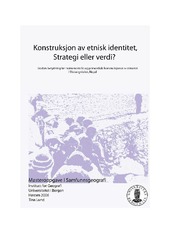Konstruksjon av etnisk identitet, Strategi eller verdi? Steders betydning for instrumentelle og primordiale konstruksjoner av etnisitet i Manang-dalen, Nepal
Master thesis

View/
Date
2006Metadata
Show full item recordCollections
- Department of Geography [634]
Abstract
The masters thesis “construction of ethnic identity, strategy or value?” discusses the main problems of migration in two small local villages in Manang-valley, Nepal. In all societies and all cultures people have to relate to different types of people. The relationship between place and identity, and place and ethnicity are emphasized. A distinction is drawn between two understandings of identity and ethnicity: an essentialist or primordial conception and a constructivist or instrumental conception. The primordial conception is stating a natural form for ethnic groups, based on a common culture and common past and future. The instrumental conception is stating that ideas of culture and traditions are used as a strategy for gaining political or economic advantages. In the Manang- valley we can identify one ethnic group: Nyeshang. The ethnic group has the same culture, the same language and a common present and future. Still we can identify two different ways of ascribing the group. In Manang village we find that people use the ethnic group to protect the natural resources such as land for agriculture and land for hotels and other facilities. Therefore we recognise an instrumental form for ethnicity. In Ghyaro village we find that people base the ethnic group on a natural form, stating that anyone can become a part of the ethnic group, as long as they follow the rules and norms characteristic to the group. But why is ethnicity in Manang more protectionist than in Ghyaro? To explain this statement, we have to bring place and space in to the discussion. In this paper, place is used as a social construction. This implies that place is formed by people, including the meaning people gives to place, and also the way people form place physically. When people ask who we are, it is often related to where we are. The ideas, believes, behaviour and values that is produced in a place is reproduced through ideology. Places are constantly changing and the social constructions in place decide what the place should contain. Ethnic groups can therefore not be seen as homogenised, as either instrumental or primordial, but as a construction of place and meaning.
Publisher
The University of BergenCopyright
The authorCopyright the author. All rights reserved